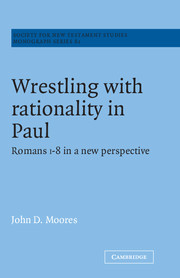Book contents
- Frontmatter
- Contents
- Acknowledgements
- List of abbreviations
- Introduction: The layout of this study and the approach behind it
- 1 Enthymematic semiosis in Paul
- 2 Varieties of enthymematic effect in Romans 1–4
- 3 Ways in which enthymemes arise in Romans 5–7
- 4 How enthymematic argument stands in Romans 8
- 5 Knowing what tune Paul is playing
- Conclusions reached their scope assessed
- Notes
- Bibliography
- Index of names
- Index of technical terms
2 - Varieties of enthymematic effect in Romans 1–4
Published online by Cambridge University Press: 08 October 2009
- Frontmatter
- Contents
- Acknowledgements
- List of abbreviations
- Introduction: The layout of this study and the approach behind it
- 1 Enthymematic semiosis in Paul
- 2 Varieties of enthymematic effect in Romans 1–4
- 3 Ways in which enthymemes arise in Romans 5–7
- 4 How enthymematic argument stands in Romans 8
- 5 Knowing what tune Paul is playing
- Conclusions reached their scope assessed
- Notes
- Bibliography
- Index of names
- Index of technical terms
Summary
The character of the enthymeme. Identifying enthymemes.
There is no other Pauline letter in which inferential argument figures more prominently than it does in Romans. Much of this argument takes the form of immediate deductive inference, where each conclusion is drawn from a single premise. Often these two-part units occur in sequence so that the conclusion of one forms the premise of the next. But conclusions involving two premises also often occur, and the resulting process of mediate deductive inference introduces the argumentative structure which is that of the syllogism. The surface structure of Paul's discourse, however, is not normally syllogistic but enthymematic, the syllogistic argument which underlies his statements remaining only partly expressed, and what is expressed being often expressed obliquely.
‘If God be for us, who can be against us?’ is an oblique way of arguing that given God's support we are invincible. It takes as read the premise that God is invincible. Compare the principle behind Goneril's words to Lear: ‘As you are old and reverend, you should be wise.’ They assume the premise that the old are wise. The illustration was among those used by H. W. B. Joseph, who made a number of extremely important points regarding the enthymeme, which nothing in subsequent developments in logical theory has rendered less valid:
An enthymeme … is not a particular form of argument, but a particular way of stating an argument. The name is given to a syllogism with one premise – or, it may be, the conclusion – suppressed. […]
- Type
- Chapter
- Information
- Wrestling with Rationality in PaulRomans 1-8 in a New Perspective, pp. 33 - 67Publisher: Cambridge University PressPrint publication year: 1995



